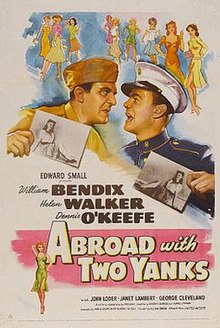Edward Small
In November 1943 the project was with Edward Small and was called Waltzing Matilda. William Bendix and Dennis O'Keefe were attached to star. [4] The film was to be the second in a two-film contract between O'Keefe and Small, the first being Up in Mabel's Room . [5]
The title was eventually changed to Abroad with Two Yanks. Small later said he mainly bought the story because this title was so appealing. [6]
In January 1944 Edward Small announced the film would be his next for United Artists. Lou Beslow and John Twist were writing the script and Lew Seiler was borrowed from 20th Century Fox to direct. [7] However, by February Allan Dwan, who had just made Up in Mabel's Room for Small, had been signed to direct [8]
Anna Lee was meant to play the female lead. She accepted the part while in Las Vegas for her divorce proceedings. However, on returning to Hollywood she decided that the part was not suitable for her and pulled out of the film. She was replaced by Helen Walker, who was borrowed from Paramount. [9] [10]
Filming started March 1944. Dwan said "That was a lot of fun - Bendix and O’Keefe dressed up like girls. We used a theatre in Hollywood for some of the interiors, right next to the Brown Derby. Now, it was such a hell of a job putting on that make-up and harnessing on those clothes, that they kept them on when we all went out to lunch." [11]
Hedy Lamarr took a photo with Bendix and O'Keefe around the making of the film which Small subsequently issued. Lamarr then sued Small for damages. [12]
Dwan said "Small had writers sitting with him while I was shooting. And around two or three in the afternoon he’d send down the pages that were supposed to have been shot that morning, but I’d already shot what I wanted to shoot and we’d just file the script away. So I was always off-the-cuff and he was about a day behind me with the script all the way through." The director enjoyed working with Small though calling him "a pro. A great showman and not an interfering guy. He knows his way." [13]
